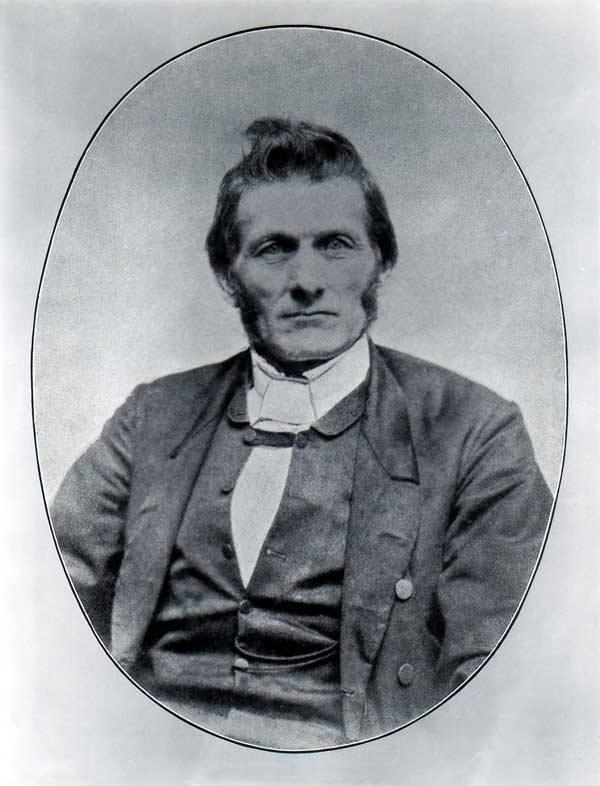
Source: Link
McLEOD, EZEKIEL, Baptist clergyman and journalist; b. 16 Sept. 1812 in Penobsquis, N.B.; d. 17 March 1867 at Fredericton, N. B.
Whatever early education McLeod received was at Penobsquis, for he moved to Saint John as a young man and tried his hand at merchandising and milling. Soon, however, he was active in the Free Christian Baptist Church, entering the ministry in 1848. He then became an itinerant preacher in Westmorland County where, in association with the Reverend Samuel Hartt, he helped found a number of churches.
Though poorly educated, McLeod appears to have had considerable natural ability and practical insight. He became convinced that the evangelicalism of the Free Christian Baptist Church was being ridiculed because it was not properly understood and that public education was the answer. He returned, therefore, to Saint John in 1853 to establish the Religious Intelligencer and Bible Society, Missionary and Sabbath School Advocate under the sponsorship of the New Brunswick Baptist Conference. Though opposed by some in his church, the semi-monthly newspaper thrived and became a weekly in 1854. For the next seven years McLeod directed both the Religious Intelligencer and the Free Baptist Church of Saint John. In 1861 he moved to Fredericton where he presided over the largest Free Baptist chapel in the province and helped to establish others in the York County region. At the time of his death he stood out as the leader of his denomination in New Brunswick. The Religious Intelligencer, the most outspoken Protestant newspaper in the province, also made McLeod one of the best known Protestants.
From its inception the Religious Intelligencer united Protestant fundamentalism with an evangelical fervour for moral reform and public stewardship. Thus the paper supported Sunday schools, Bible societies, and foreign missions. Its moralistic tone and zealous anti-Catholicism were combined with a deep strain of humanitarianism. Slavery was condemned and the North supported in the American Civil War; cruelty to Indians was denounced; ignorance was fought with support for a public non-sectarian school system.
McLeod maintained firm control over the paper, leaving no doubt about his opinions. There were few more aggressive supporters of prohibition in New Brunswick. “The question of Prohibition and Anti-Prohibition in St. John,” he wrote in 1856 at the height of the struggle over Samuel Leonard Tilley*’s Prohibition Act of 1855, “is fast assuming its true aspect, which is Protestantism and anti-Protestantism; and the sooner it becomes fully developed the better.”
Perhaps because of Tilley’s leading role in the prohibition movement or his evangelical inclinations, McLeod became a forceful ally of Tilley’s party and the confederation scheme. Throughout 1865 and 1866 the Religious Intelligencer was filled with articles on the dangers to Protestantism and the responsibilities of British subjects. “The ‘Protestant faith’ and the ‘open Bible’ are in danger,” he declared in an editorial on the sensitive York County by-election of November 1865, “and the climax is, that . . . the people of York had better vote against the anti-Confederate candidate and for Mr. [Charles Fisher*].” The anti-confederates were labelled as the “Catholic Party” in sympathy with Fenianism. Tilley encouraged McLeod and supplied him with suggestions and information. When the confederation party was returned to power in June 1866 the Religious Intelligencer announced proudly: “The people of this Province have not only fought the battle of Confederation, and won, but they have struck a blow against Fenianism and disloyalty . . . .”
Although McLeod received letters from Tilley and Fisher written in London in January 1867, informing him that all hurdles had been cleared, he did not live to see confederation. In March of that year he died of bilious fever. He was survived by his wife and nine children. One clergyman son, Joseph, continued to edit the Religious Intelligencer.
N.B. Museum, McLeod family papers. UNBL, MG HIO. Morning News (Saint John, N.B.), 20 March 1867. Morning Telegraph (Saint John, N. B.), 21 March 1867. New Brunswick Reporter and Fredericton Advertiser, 22 March 1867. Religious Intelligencer and Bible Society, Missionary and Sabbath School Advocate (Saint John, N.B.), 1853–67. Harper, Hist. directory. G. E. Levy, The Baptists of the Maritime provinces, 1753–1946 (Saint John, N.B., 1946). Joseph McLeod, “A sketch of the history of the Free Baptists of New Brunswick,” E. M. Saunders, History of the Baptists of the Maritime provinces (Halifax, 1902), 410–21.
C. M. Wallace, “McLEOD, EZEKIEL,” in Dictionary of Canadian Biography, vol. 9, University of Toronto/Université Laval, 2003–, accessed November 28, 2024, http://www.biographi.ca/en/bio/mcleod_ezekiel_9E.html.
The citation above shows the format for footnotes and endnotes according to the Chicago manual of style (16th edition). Information to be used in other citation formats:
| Permalink: | http://www.biographi.ca/en/bio/mcleod_ezekiel_9E.html |
| Author of Article: | C. M. Wallace |
| Title of Article: | McLEOD, EZEKIEL |
| Publication Name: | Dictionary of Canadian Biography, vol. 9 |
| Publisher: | University of Toronto/Université Laval |
| Year of publication: | 1976 |
| Year of revision: | 1976 |
| Access Date: | November 28, 2024 |